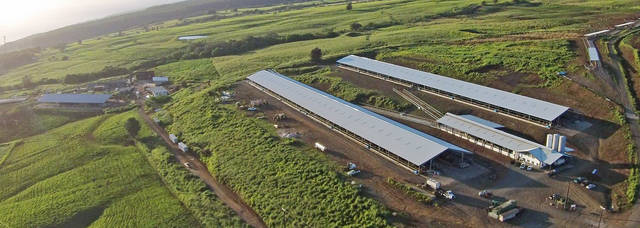Big Island Dairy still struggling with runoff problems

Big Island Dairy seen from an aerial view. (Courtesy photo/Big Island Dairy)
HILO — Big Island Dairy officials say steps are being taken to reduce the possibility of future wastewater discharges at the Ookala facility.
HILO — Big Island Dairy officials say steps are being taken to reduce the possibility of future wastewater discharges at the Ookala facility.
Residents of Ookala have complained for several years about releases of manure-laden water into nearby gulches that run through or next to the community.
A discharge in May released nearly 2.3 million gallons of rain and wastewater over three days, and in August, heavy rain from Hurricane Lane caused a wastewater pond at the dairy to overflow, sending more untreated effluent into a nearby gulch.
General manager Steve Manning, who took the helm in April, said the dairy has “already done a lot to prevent future spills or future discharges.”
Big Island Dairy has reduced the number of cows they are milking “significantly” to help maintain the wastewater lagoon levels, he said.
And the facility no longer has a heifer development station above the dairy, which means that water or manure waste is no longer entering the lagoon system. Removing that waste relieves pressure on the lagoons, Manning said.
According to Manning, the dairy also has installed a pump system and hose to carry lagoon water above the dairy to fertilize pastures there.
“So now we can go below and above the dairy to do the fertilizing,” he said, which is beneficial “so we don’t over-applicate the bottom ground. We can apply agronomically to the fields, and it’s better for our pastures above. We don’t have to buy outside fertilizer. We can use our own for our pastures.”
Manning said the amount of waste material going into the lagoon has been reduced by nearly 50 percent.
The dairy also is “looking very seriously” into a lagoon cover that would keep rain water out, he said, and it might also cover more “open lanes,” or open areas where the cows lay, to keep rainwater off of those spaces and to lessen the impact to the dairy’s lagoon.
“All open areas that would affect the lagoon system, we’re thinking about covering them all,” he said.
Big Island Dairy also is utilizing products from Aqua Natural Solutions to help with odor control, “which we feel it’s helping dramatically” and which Manning said will help break down solid material and sludge buildup in the lagoon system.
Brian Griggs, president and CEO of Aqua Natural Solutions, said his company provides “beneficial cultures” that speed up the breakdown of raw materials at the molecular level, and turns materials that would normally cause offensive odors into “natural, harmless gases that are actually environmentally beneficial.”
“By pre-treating the wastewater, in the event that they do have an overflow, (it is) very unlikely the folks down stream will realize it happens because it won’t have an offensive odor,” he said.
In addition to odors, Griggs said the beneficial bacteria also eliminate pathogens, making water in the ponds safer. The series of products the company uses can also restore “natural balance to the soil” and can provide benefit to aquatic life if discharged into the water, he said.
Manning said Big Island Dairy has been implementing these products for four months and can tell a difference with the odor.
“How it’s doing in the lagoons, time will tell that.”
County Council Chairwoman Valerie Poindexter, who is the District 1 council representative, however, said she has received calls from residents complaining about the smell in recent days, which she reported to the dairy.
“Smell is still an issue,” she said. “We thought they had the smell under control. They bought something to treat the effluent ponds. For a little while, we thought it was handled, (but) the smell came right back again.”
Prior to the discharges earlier this year, the dairy was fined $25,000 in 2017 for an unlawful discharge, and a lawsuit has been field in federal court alleging violations of the federal Clean Water Act.
State Department of Health spokeswoman Janice Okubo said the DOH continues to monitor the dairy.
“At this time, no new fines have been levied against Big Island Dairy, and Clean Water Branch investigations are ongoing,” she said.
According to Okubo, the dairy remains under an order to cease the discharge of wastewater from its facility into state waters.
“It should be noted that while the dairy has discharged wastewater in violation of the order, recent discharges have been associated with major rain events on the island of Hawaii,” she said. “The DOH has been working directly with the dairy on making changes to the way the facility manages its wastewater, manure and animals to reduce risk to those in and around the Ookala area, as well as the environment.”
The DOH provides compliance assistance and support after “extraordinary weather events” that cause discharges that would otherwise be punishable, said Okubo.
“We are following up with the dairy and others to assist in the prevention or reduction of future discharges of a similar nature,” she said. “If, during our follow-up, we find evidence of unlawful discharges not related to severe weather, we will proceed in our normal mode and take enforcement action.
“Prior to Hurricane Lane, the dairy reported reducing the size of its herd to reduce the amount of wastewater and has also conducted maintenance of the upper lagoon. Storm water that falls directly into the ponds continues to be an issue.”
“We are committed to do what’s best for the land and the community,” Manning said. “We’re committed to abiding by all the rules, state and federal.”
Email Stephanie Salmons at ssalmons@hawaiitribune-herald.com.


